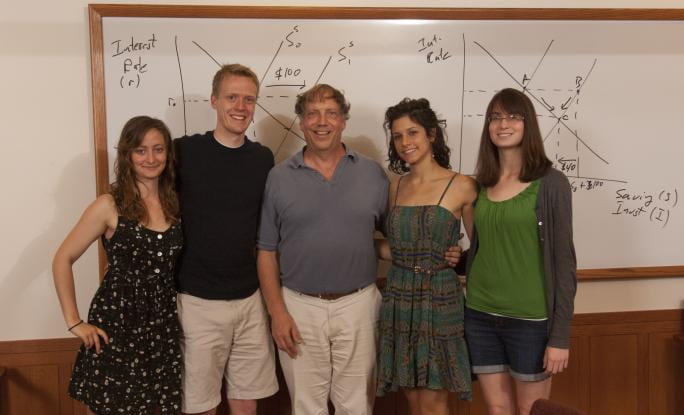
Welcome to Muddy Water Macro! This site presents our view about how macroeconomic theory and evidence can be reconciled to understand the world in which we live. In our judgment, a broad Keynesian approach best meets this objective, but we take seriously the objections of those who criticize Keynesian thinking. We aim for a balanced and accessible exposition of alternative perspectives.
The Muddy Water Macro (MWM) Vision
Professor Steven Fazzari of Washington University in St. Louis, has developed what we call here the Muddy Water Macro (MWM) perspective through his peer-reviewed publications. And these ideas have been explored, extended, and transformed in lecture and discussion with thousands of students over three decades. The extraordinary interest in macroeconomics following the Great Recession of 2007-09 and the obvious importance of the subject for understanding intense debates about how public policy should respond to these events convinced Fazzari to pursue the project of explaining these ideas to a broader audience.
Macroeconomics is controversial. The ideas on this site reflect the perspective of the MWM team on these issues. Many of our pages take the form of an informed debate between Keynesian theory and alternative perspectives.
The pages on this site strive to provide:
- Exposition of Keynesian macro theory
- Consideration of alternative views, along with Keynesian responses to the critics
- Connections between prominent policy positions and the underlying theories
- Discussion about how evidence, drawn primarily from the recent performance of the U.S. economy, helps us distinguish between competing views
- Explanations that are thorough but accessible to a reader with little or no prior background in macroeconomics (See our user’s guide for further discussion.)
We hope that you find our content clear and informative. While we do not hesitate to share our judgment about controversial issues, we hope that our readers will find a balanced treatment of modern debates in these pages.
What’s In a Name?
Our title, Muddy Water Macro, reflects three related characteristics of this site:
- These ideas had their origin in St. Louis, at the confluence of the mighty Mississippi and Missouri rivers (see picture). Anyone who has seen these rivers can attest to their muddiness.
- Mainstream macroeconomic thinking is often divided into “saltwater” and “freshwater” camps. Many of the most prominent proponents of Keynesian ideas (for example, the idea that stimulative monetary policy can speed recovery from a recession) hold academic positions at universities like Harvard, Princeton, and MIT—near saltwater. Many “new classical” economists (who often argue, for example, that monetary or fiscal stimulus would not improve economic conditions) teach at schools in Chicago, Minneapolis, or Rochester—very near freshwater. Our perspective differs in some important ways from both of these schools. So, in the spirit of the location and water theme, we chose “muddy water.”
- Some critics of our name have pointed out that “muddy” is a synonym for unclear. Well, macroeconomic debates these days are somewhat “muddy,” as feuding sides often seem motivated more by scoring debating points or winning political advantage rather than clarifying our understanding of how the economy works. Thus, we hope that our contribution will help readers wade into the “muddy water” of difficult issues. Our primary objective, however, is clarity. We strive to provide a clear exposition of the ideas while offering a sense of how the logic and evidence inform our judgment on controversial economic issues.
What We Are Not
This site is not a blog. Our pages do not take up daily developments on economic issues. Nonetheless, we use recent events and data extensively to illustrate out points and to inform our judgment among competing ideas and policy recommendations. Furthermore, we hope to be of use to bloggers. It is not possible for people who comment regularly on current events to explain the background for their perspectives in detail. We provide an open-access resource to those who want to understand the ideas behind issues currently debated in the blogosphere.
We also do not claim to be a reference for all ideas in macroeconomics The site is dynamic, offering regular elaboration and addition of content. Our selection of content is directly motivated by what we anticipate will be of most value to most people who want to make sense out of current macroeconomic debates. That said, we recognize the importance of many of the ideas not yet covered on our site. We welcome your feedback on our existing content, the architecture and accessibility of this site, and new topics that you believe would benefit our readers.
Contributors and Financial Support
In addition to Professor Fazzari, several current and former Washington University economics students have drafted content for these pages and engaged in extensive discussion and editing to make the ideas presented here clear and complete.

The initial development team of Arlan Cohen, Madeleine Daepp, Cara Nickolaus, and Hannah Shaffer worked intensively on our content in the summer and fall of 2011. Barry Cynamon provided useful feedback as the initial pages began to take shape.
Major financial support that allowed this project to get off the ground came from the Institute for New Economic Thinking. The Weidenbaum Center and the Humanities Digital Workshop at Washington University also provided generous financial contributions to the work reflected here. We thank our supporters for these resources that made this project possible.